SPFBO 7 – The First Eliminations
Welcome to our First Eliminations post for SPFBO 7.
This week, we are looking at the “Our World” batch. You can find out more about this week’s posts in our Meet the Batch post.
In the best traditions of Highlander (and Grandslam Tennis Tournaments like Wimbledon) there can be only one ultimate winner/champion and the whole SPFBO process is one of whittling down 300 bravely submitted books to just one SPFBO champion. The path to that final announcement is littered with elimination posts like this – The Hive’s first of SPFBO7.
However, we hope that the judges comments will shine a bit of light on the entrants and maybe give others some reasons to pick up these books or follow these authors in future.
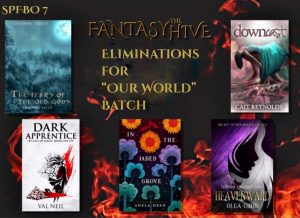
Dark Apprentice
by Val Neil
Theo:
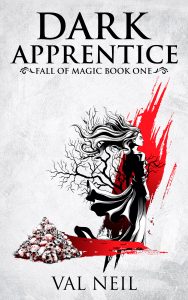 I liked the snarky opening with Medea, but Nickolai struggles to be likeable. Anti-heroes aren’t inherently a bad thing, but Nickolai’s crude exploitation of everyone, particularly around sex, is uncomfortable. The bits of nice snarky banter unfortunately give way to a bit too much navel contemplation and exposition as the characters examine their own motivations and/or brain structures. I liked that it was set in Ireland and makes reference to the Fae, but the world building needed more innovation to get beyond the Harry Potter style world of a magical community living in parallel with a wider population of mundanes (muggles?).
I liked the snarky opening with Medea, but Nickolai struggles to be likeable. Anti-heroes aren’t inherently a bad thing, but Nickolai’s crude exploitation of everyone, particularly around sex, is uncomfortable. The bits of nice snarky banter unfortunately give way to a bit too much navel contemplation and exposition as the characters examine their own motivations and/or brain structures. I liked that it was set in Ireland and makes reference to the Fae, but the world building needed more innovation to get beyond the Harry Potter style world of a magical community living in parallel with a wider population of mundanes (muggles?).
Belle:
I really enjoyed the opening of this, and would quite happily read a whole book about Medea – she is completely done with everyone’s nonsense and doesn’t care if they know it, and I am a sucker for characters like that.
Unfortunately I disliked Nikolai so much that I struggled to make it to 20%. I don’t mind unlikeable protagonists, they can be a lot of fun to read even if I disagree with everything they say, but Nikolai was just so nasty, misogynistic and bi-phobic that I had to stop reading.
Peter:
I was drawn in to this one via the cover and really enjoyed the opening with Medea, who happens to be immortal and is a fascinating protagonist. Also a point in the book’s favour is the plot point of learning magic and being an apprentice, it’s something I enjoy and the banter between two of the characters was entertaining as well. However, the major disappointment in this book for me, was one character. Nikolai was pitched as an Anti-Hero character, and he is, but he has this horrendous disdain for people which really put me off. He sees people as either useful or useless to him, and his viewpoints were filled with…let’s just say things I don’t enjoy.
Scarlett:
Dark Apprentice features the dark character of Nikolai, who comes to Haven to seek training with the deadly mage Medea. I must admit, I LOVE dark characters, and Nikolai has pushed the envelope to the point of disdain and hate towards him by readers. Personally, this antagonist didn’t bother me that much but I completely understand what others are concerned about. He is rude and ruthless, raw, unrefined, and an immoral prick. I viewed it more as in the movies, where an actor can play a role so controversial and out of character for them that you actually dislike the person acting. Some people will enjoy that and others won’t. So, Nikolai meets his match in Medea, equally strong as a person, with a history of killing all her apprentices, but who is slightly intrigued by Nicolai…and that is what makes this story so interesting. Their interaction is what hooked me while reading. I did enjoy this dark and cold-hearted read, but it definitely isn’t for everyone.
Calvin:
Here is a story that checks some major boxes for what I like. We have a fascinating immortal protagonist and lots and lots of magic. What’s more, one of the major plot points revolves around learning that magic. As I soon discovered, there is also a nice bit of banter between the two main characters. This was all kinds of up my alley. In the end, I was disappointed that this one didn’t end up working for me. We have two main characters in this novel, Medea and Nikolai. While I found Medea engaging and interesting, Nikolai was simply unlikeable. In fairness, it’s very rare that an unlikeable protagonist works for me. In this case, Nikolai has a certain casual disdain for people that almost immediately turned me off. He sees people in very stark terms, useful or useless (to him). To top it off, his viewpoints tend to be filled with male gaze. For those who thoroughly enjoy the unlikeable protagonist trope, you may find plenty to like here.
Heavenward
by Olga Gibbs
Theo:
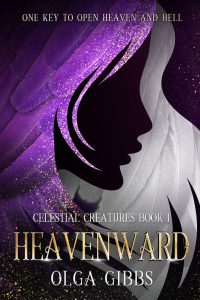 Heavenward presents as paranormal romance story where the geeky school girl finds that the most smoulderingly attractive of a group of new arrivals is inexplicably strongly attracted to her, damaging her school position and putting the local top girl’s nose out of joint, despite the protagonist’s best efforts to put her new admirer off. Gibbs’ story is set in England though I’m not sure she’s caught the exact rhythm of English school life and at one point there was a reference to “feds” which felt quite anachronistic. I read up to 21% and then skimmed on a bit further trying to see where the story was going. It’s a readable story and, for me, the most interesting aspect was the protagonist, Ariel, living in a children’s home. The prose flows, but does become a bit purple at points. I have not read much paranormal romance so I doubt I will pick out identifiable tropes of the sub-genre. However, the author lavishes a lot of attention on descriptions to the extent that it feels almost “female-gazey.” The extensive description of a male character’s physical attractiveness make the first person protagonist seem a bit shallow. Maybe it is intended to convey the character’s supernatural nature shining through in a physical beauty? One of the other problems that paranormal romances like this seem to have is that, starting in our world and without the benefit of a quick portal transition to the secondary world, they have to do a lot of set-up work in the real world and slowly introduce the strangeness of the supernatural element. The upshot is that – by the 20% mark, the plot – or at least the reader’s understanding of the plot – has not moved on much beyond the “A stranger comes to town” stage of things. It is readable, but by this stage the protagonist hasn’t shown enough agency and her supernatural companion enough vulnerability to make me keen to read on.
Heavenward presents as paranormal romance story where the geeky school girl finds that the most smoulderingly attractive of a group of new arrivals is inexplicably strongly attracted to her, damaging her school position and putting the local top girl’s nose out of joint, despite the protagonist’s best efforts to put her new admirer off. Gibbs’ story is set in England though I’m not sure she’s caught the exact rhythm of English school life and at one point there was a reference to “feds” which felt quite anachronistic. I read up to 21% and then skimmed on a bit further trying to see where the story was going. It’s a readable story and, for me, the most interesting aspect was the protagonist, Ariel, living in a children’s home. The prose flows, but does become a bit purple at points. I have not read much paranormal romance so I doubt I will pick out identifiable tropes of the sub-genre. However, the author lavishes a lot of attention on descriptions to the extent that it feels almost “female-gazey.” The extensive description of a male character’s physical attractiveness make the first person protagonist seem a bit shallow. Maybe it is intended to convey the character’s supernatural nature shining through in a physical beauty? One of the other problems that paranormal romances like this seem to have is that, starting in our world and without the benefit of a quick portal transition to the secondary world, they have to do a lot of set-up work in the real world and slowly introduce the strangeness of the supernatural element. The upshot is that – by the 20% mark, the plot – or at least the reader’s understanding of the plot – has not moved on much beyond the “A stranger comes to town” stage of things. It is readable, but by this stage the protagonist hasn’t shown enough agency and her supernatural companion enough vulnerability to make me keen to read on.
Belle:
I was really curious to see what Heavenward would be like, as I felt like the blurb (as listed on Goodreads) was describing two very different stories. Unfortunately reading the book didn’t help clear anything up, and I found that I wasn’t as gripped by the main plot as I had hoped.
The biggest strength for me was in the descriptions of Ariel’s mental illnesses and how that colours her views of the world. I thought that was quite well handled.
I didn’t find the introduction of the angels or the set up for the (presumed) love triangle to be particularly believable, but I am rarely a fan of instalove type settings, and perhaps that sorts itself out later on in the book.
I think the book and series has a lot of potential, but I am unlikely to continue with it.
Peter:
I am going to be honest, paranormal romance is not really my thing. What I did appreciate about this one though was the Angel aspect, a nice little hook and moving this very popular genre in a different direction. I enjoyed the main protagonist Ariel and her story but sadly the rest didn’t work for me, the prose was quite bland and the use of present tense was interesting but didn’t really work with this story. Insta-love is a trope which puts me off massively, I much prefer stories where relationships grow but maybe the supernatural aspect has a part to play here? I am not really sure but if a YA Teen romance book is your thing then you will find a lot to like here.
Scarlett:
Heavenward was such an easy-flowing, readable story, it seemed practically effortless to get into. While I was reading it on my kindle, I made a lot of highlights to look over as well as jot down some of my thoughts. I usually don’t read YA or paranormal romance, and unfortunately, despite such great flow, my sentiments go along with much of what Theo had already mentioned. Most of my notes were all about how luscious someone’s tousled hair fell or how velvety soft a voice was. The prose was very embellished, too embellished for me, but I am also way above the targeted age group, I assume. Gibbs breaks up some of the cuteness with the main protagonist’s dreams of armor and a sword…still sparkly, but a more interesting addition to the story. What I was desperately missing was something meaty, some take away, something imperfect, but unfortunately, I too felt that by the end of reading 20% of the novel, I wasn’t any more invested in the characters as I was at the beginning of reading. I do think a younger audience will find enjoyment in Heavenward.
Calvin:
This is a YA teen romance with an interesting hook–angels! I appreciated that we were getting something a bit more unique than your average vampire or werewolf story–as popular as those tend to be. I also thought the particulars of the protagonist, Ariel, and her life were interesting and engaging. Unfortunately, much of the rest of the story didn’t work for me. The prose was a bit purple at times, overfull with metaphors and similes. It is also written in present tense, which often pulls me out of the story. That’s a very personal preference issue, and so your mileage may vary quite a bit on that. There is also quite a bit of insta-love, which is another trope that tends not to work for me. I prefer relationships between characters that get worked out over time, building up and helping me understand why the characters are attracted to one another. In this case, we have attraction, but also multiple requests by the female protagonist for the male characters to leave her alone which they generally ignore. The story so far gives me the impression that some of this may be explained through magic or the supernatural nature of characters. I don’t know that for certain, but that’s where it feels like the story is headed, so for those who love the YA romance genre and don’t mind some purple prose, you may find plenty to like in this one.
The Tears of the Old Gods
by Emanuel Akeyo
Theo:
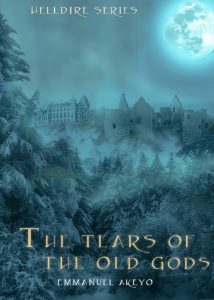 The story idea is interesting, though its mixed urban & magic nature left me unsure whether it was our world or a secondary world very like ours. There are plot details I would query (is a shotgun really an animal hunter’s weapon of choice?) but the mix of magic and contemporary details, of humans and shape shifters has promise. I also applaud anyone who can write a full length novel in a second language, a task I know I am totally unequal to. However, I feel this book would really have benefitted from a good professional English language edit as there are too many times when linguistic/grammatical traps jerked me out of the story. Leaves “wrestling” rather than “rustling.” He/she and his/her used in the wrong gender context – as though conforming to and agreeing with the (gendered) object rather than subject of a sentence. Where the prose does avoid these pitfalls, it still suffers from things like run-on sentences, where half a paragraph can be taken up with what would be more digestible as three different sentences. A good edit would have smoothed the flow of the story and let it come through to the reader more as the author intended.
The story idea is interesting, though its mixed urban & magic nature left me unsure whether it was our world or a secondary world very like ours. There are plot details I would query (is a shotgun really an animal hunter’s weapon of choice?) but the mix of magic and contemporary details, of humans and shape shifters has promise. I also applaud anyone who can write a full length novel in a second language, a task I know I am totally unequal to. However, I feel this book would really have benefitted from a good professional English language edit as there are too many times when linguistic/grammatical traps jerked me out of the story. Leaves “wrestling” rather than “rustling.” He/she and his/her used in the wrong gender context – as though conforming to and agreeing with the (gendered) object rather than subject of a sentence. Where the prose does avoid these pitfalls, it still suffers from things like run-on sentences, where half a paragraph can be taken up with what would be more digestible as three different sentences. A good edit would have smoothed the flow of the story and let it come through to the reader more as the author intended.
Belle:
For better or worse, Goodreads is where I go to get blurbs, and as there is no description listed for this book, I had no idea what I was in for when I started reading.
I did struggle quite a bit reading this – as Theo has already said, an edit would do wonders for clearing up a lot of the grammar issues that jolted me out of the story as I tried to untangle the intended meaning. I also found a lot of the dialogue difficult to follow, and more than once wondered what connection it had to furthering the story.
I hope the author continues to write and work on their craft, as I would like to see more of their work in the future.
Peter:
I think like a couple of our team, I was really drawn into this one by the premise. Now while the prose felt rough, I liked some of the ideas the author is trying to get through. I will be honest and say it was tough getting through the 20%, the prose was shaky and the lack of fluency and flow of the novel made it tough reading. I am always in awe of anyone who writes a book and publishes it, especially if English is not their first language. I echo Theo in that the book could have really done with a good edit and then I feel it might have really hit the ground running. That said though, the author clearly has some good ideas flowing, it’s just not quite what I was expecting.
Scarlett:
My thoughts on this novel go along with those that have already been shared by the other judges on the team. Though the story jumps right into a nice setting, the tale of Mercy, the main character, is rather told than shown. There were so many great nuances present with attention to detail to objects and setting, but in terms of the flow of the story, it felt like all the instruments of an orchestra were present, yet it wasn’t always in sync or harmony to me. I do feel that the book has the potential to shine with a good polish by a professional editor.
Calvin:
This is one where the premise was really interesting and I was looking forward to the story as I dove in. Unfortunately, the prose was quite rough, and the dialog even more so. I believe the author’s native language is not English, and I have to give huge props to anyone able to complete a full-length novel, much less one in a second language. However, in the end the lack of flow and fluency to the narrative and dialog caused me to repeatedly bounce out of the story.
And so our quarter-finalists are
Downcast by Cait Reynolds and In The Jaded Grove by Anela Deen
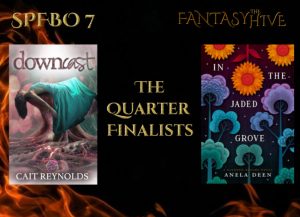

[…] 1 ‘Our World’: Meet the Batch | Eliminations | […]
[…] 1 ‘Our World’: Meet the Batch | Eliminations | […]